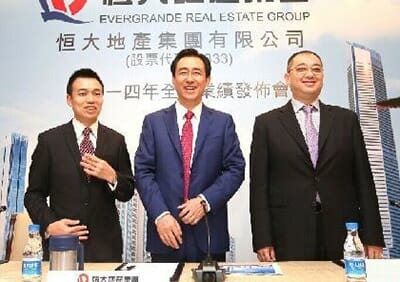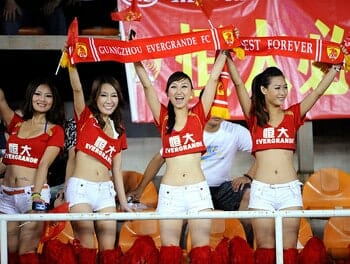
Evergrande chairman Xu Jiayin (centre) appears with other officials at the company’s earnings report last week.
Evergrande Real Estate Group last week announced plans to set up a cosmetic surgery business in a special economic zone on China’s Boao island as the giant property developer continues to branch out into new business areas.
At an event on the resort island which annually plays host to the Boao Forum for Asia, Evergrande chairman Xu Jiayin signed a cooperation agreement with the local government and a Korean cosmetic medical group to establish a “world-class medical cosmetic and anti-aging center” in an economic zone on Boao.
Evergrande is making the push into the cosmetic surgery field despite suffering significant losses last year from several new businesses that it started, and recently closing a nascent solar energy venture which it started in 2014.
Evergrande Attempts to Build a Healthy Brand
The new facility, which will be in Boao’s Lecheng International Medical and Tourism Pilot Zone is said to be intended for tourists who want to combine their holidays with plastic surgery, Botox and other anti-ageing medical treatments. No investment figures were announced related to the cooperation frame work.
Evergrande, through its Hong Kong-listed subsidiary, New Media, already owns a plastic surgery centre in Tianjin, which is operates together with South Korea’s Wonjin Beauty Medical Group. The Korean firm is also the partner in the Boao venture.
The top five China real estate developer saw its profits edge lower last year, and now portrays the new plastic surgery clinic as part of the company’s development of a group of new profit centres focused around health and diet. The company already has made it know that it plans to rename New Media as Evergrande Health Industry Group.
New Businesses Losing Money for Guangzhou Developer
The other businesses that are likely to be folded into Evergrande’s health group include the bottled water business that the developer launched in January of last year, as well as new ventures in grain and cooking oil production. Evergrande also purchased New Zealand-based infant formula maker Cowala Dairy last October, with the safety of baby formula continuing to be a major health concern on the mainland.
So far, however, these new businesses have proved to be a drag on Evergrande’s bottom line. According to the company’s 2014 financial results, which were also released last week, the developer’s non-real estate businesses recorded a loss of RMB 3.13 billion last year, with the bottled water division representing RMB 2.37 billion of those losses.
Late last month the real estate developer announced that it was cancelling a $15 billion venture into solar power that it had launched to great fanfare last year.
Developers Diversifying in the Face of Market Slowdown

Evergrande also owns the Guangzhou Evergrande football team
While Evergrande is facing difficulties with its new businesses, diversifying away from residential real estate development is a common theme among China’s property companies as the market slows down.
Last month China’s National Bureau of Statistics revealed that the country’s housing prices fell at a record pace of 5.5 percent in February, continuing a nearly year-long slide.
Faced with compressing margins in their core businesses, leading developers such as Dalian Wanda, China Vanke and Greenland Group, have all been looking for opportunities to be less reliant on home building for their returns.
Unlike Evergrande, however, most of these developers have chosen to stick with businesses closer to their past experience and existing expertise. Vanke has moved into commercial real estate and overseas development opportunities, with Greenland Group making itself into one of China’s largest overseas real estate investors. Wanda has also branched out into other fields, including cinemas and movies studios, but has still made most of its investments in the property sector.
Uncertain Financial Discipline
The challenge for Evergrande will be launching all of these new businesses, at the same time that its core business is being pressured by a market slowdown.
The Guangzhou-based company was recently singled out by Fitch Ratings as being a likely candidate for a credit downgrade due to the high levels of debt on its balance sheet, and what the US-based credit agency called “the uncertainties with Evergrande’s financial discipline.”
Although Evergrande’s stock fell more than 26 percent last year as the real estate slump unfolded, since last October it has regained much of this value.
Leave a Reply